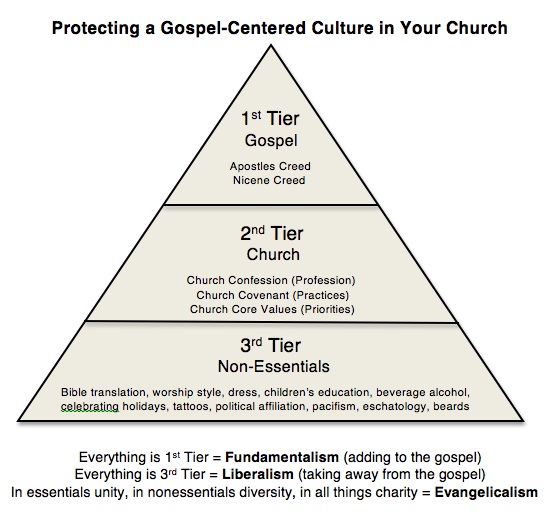
Protecting a Gospel-Centered Culture in Your Church
One of the biggest lessons I’ve learned about leadership in the local church has to do with creating, cultivating, and contending for a gospel-centered culture in the church. This past weekend, I led a discussion in our “Introduction to Grace” membership class on this very thing. I began with Albert Mohler’s well-known case for theological triage. Membership interviews and membership classes are important to the life and health of a church for several reasons, not the least of which is the need to protect/content for a gospel-centered culture in your church.
Here’s what I mean by that. If Christians are looking to join your church (via transfer growth), it could very well be that there are 3rd Tier issues that they want to make 2nd Tier or even 1st Tier issues. Some people call them “single issue Christians.” There are others that are not so obvious and can sometimes be discerned by their approach to church being a “What do you have to offer me?” kind of attitude. Either way, they want to push upward their 3rd Tier preferences and make them 2nd Tier principles. Some of these preferential non-essentials are listed in the chart below.
So here’s the deal. If at any point you as a leader allow for 3rd Tier issues to advance upward in the culture of the church, then members will become centered on something other than the gospel and factions will ensue. If passions drive preferences, and preferences are not 2nd Tier issues, then church leaders must be clear that the passion to lead the church with a gospel-centered focus is greater than their passion to drive their preferences into the culture of the church. This is protecting the unity of the flock with a gracious spirit of saying, “That’s not going to happen among us. I’m sorry.”
This is why I believe it is important to be clear with the 2nd Tier. If your church is not clear on what defines you in what you believe (confession), how you live (covenant), and what you value most (core values), then you are living in the land of assumptions with an open invitation for any member to more explicit about their preferences than you are your principles. Without those gospel-guiding principles in place as filters to protect the unity of the church, the health and welfare of the church is in a vulnerable state.
Gospel-centered leaders do not have the luxury of being accepting of personal preferences as anything more than personal preferences. They have to front with the gospel explicitly and consistently and back that up with a godly intolerance for members to be united by any greater than the good news of Jesus Christ. They themselves must exhibit by their life and actions that the greatest common denomination in the fellowship of the saints is that our names are written in the heaven as blood-bought children of God.
For some churches, gospel-centered churches must guard against liberalism, which is the neglect or dismissal of 1st Tier doctrines. On the other hand, I believe in most cases leaders must guard against fundamentalism, which is the treatment as if all matters are 1st Tier issues. A real test of the diversity we are to enjoy is whether we can experience genuine fellowship with other Christians who see 3rd Tier issues differently than us.
Here’s how I like to think about it. The 3rd Tier issues ought always be in subjection to the 2nd Tier. The 2nd Tier issues ought always be in subjection to the 1st Tier. Gospel-centered churches major on the gospel (1st Tier), and members who care deeply about the unity of the church care about the 2nd Tier (and by virtue of that, the 1st as well). If that kind of order is not functional in the church, then what you are left with sadly will look similar to this…

Tags: Scripture, Timmy Brister












